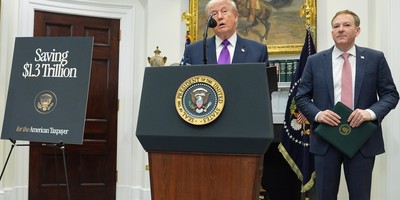In a 5-4 ruling by the Supreme Court Tuesday regarding a federal law that could deport immigrants who have committed violent crimes, Justice Neil Gorsuch sided with the liberal majority, stating that the law passed by Congress failed to define a violent crime in clear terminology.
“What does that mean? Just take the crime at issue in this case, California burglary, which applies to everyone from armed home intruders to door-to-door salesmen peddling shady products,” Gorsuch said.
“How, on that vast spectrum, is anyone supposed to locate the ordinary case and say whether it includes a substantial risk of physical force?” he asked. “The truth is, no one knows.”
In October 2017, Gorsuch voiced concern as to how the court could define violent crime when Congress had failed to do so.
“Even when it’s going to put people in prison and deprive them of liberty and result in deportation, we shouldn’t expect Congress to be able to specify those who are captured by its laws?” he said.
The recent decision involves a caseregarding James Dimaya, a native of the Philippines who has been living in the United States legally since 1992. Dimaya was charged on 2 counts of burglary in California which prompted the government to begin the deportation process.
At the time, immigration officials citeda section of immigration law which labels Dimaya’s convictions as a crime “that, by its very nature, involves a substantial risk that physical force… may be used in the course of committing the offense.”
Recommended
However, Chief Justice Clarence Thomas voiced concern that the decision could potentially lead to “the invalidation of scores of similarly worded state and federal statutes.”
Joshua Rosenkranz, who represented Dimaya in October 2017, praised Tuesday’s decision and said that it could have resulted in many more immigrants being wrongfully deported.
“This decision is of enormous consequence, striking down a flawed law that applies in a vast range of criminal and immigration cases and which has resulted in many thousands of immigrants being deported for decades in violation of their due process rights,” he said.
President Trump disagreedwith the decision via Twitter, calling it a public safety crisis.
“Today’s Court decision means that Congress must close the loopholes that block the removal of dangerous criminal aliens, including aggravated felons,” he wrote.
“This is a public safety crisis that can only be fixed by Congress – House and Senate must quickly pass a legislative fix to ensure violent criminal aliens can be removed from our society. Keep America Safe!”
University of Texas law professor Stephen Vladeck said Gorsuch’s tie-breaking vote should not come as a surprise.
“He signaled pretty clearly he was leaning this way at argument, and it’s deeply consistent with [late] Justice [Antonin] Scalia’s majority opinion,” he said.
“As for the White House, they may well be pissed, but this is Gorsuch’s formalist textualism – and the real problem lies with the statute.”
Gorsuch citeda similar decision written by Justice Scalia in 2015 as the basis for his decision.
He wrote that vague laws “can invite the exercise of arbitrary power… by leaving the people in the dark about what the law demands and allowing prosecutors and courts to make it up. The law before us today is such a law.”

























Join the conversation as a VIP Member